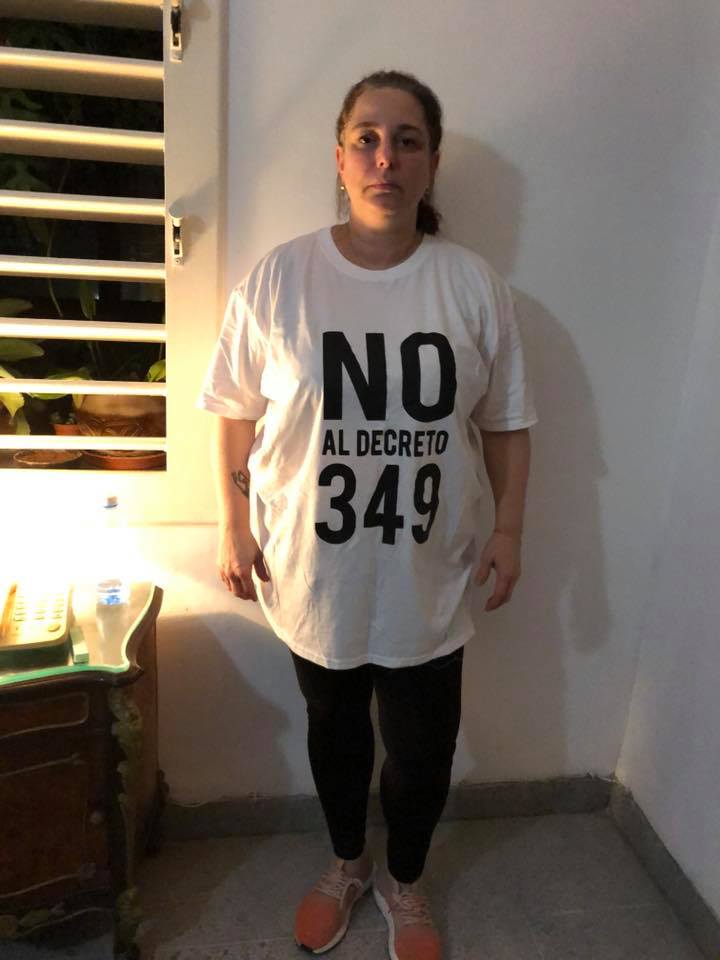[vc_row][vc_column][vc_column_text]

Cuban artist Tania Bruguera
Update: All arrested artists have now been released, although they remain under police surveillance. Cuba’s vice minister of culture Fernando Rojas has told the Associated Press that changes will be made to Decree 349 but has not opened dialogue with the artists involved in the campaign against the decree.
The following is an open declaration for all artists campaigning against the Decree 349, a law that will criminalise independent artists and place severe restrictions on cultural activity not authorised by the state. It will be read in solidarity at a gathering at Turbine Hall at the Tate Modern today from 1-2pm for those arrested this week for protesting the law. Those arrested include Luis Manuel Otero Alcantara and Yanelys Nuñez Leyva, members of the Index-award winning Museum of Dissidence, and Cuban performance artist Tania Bruguera. In all, 13 artists were arrested over 48 hours. Some have commenced a hunger and thirst strike.
The Cuban government intends to implement a regulation – commonly known as Decree 349 – which will subdue artistic and creative activity on the island, bringing it under the state’s strict tutelage. The content of the decree comprises two classical premises of any totalitarian state: the need for the artist to obtain prior authorisation for the exercise of his/her work and censorship of the creative process.
The execution of these two premises is to be overseen by an intricate structure of civil servants, subject to their discretion, thus reinforcing a “bureaucracy” which inhabits the language of revolutionary self-criticism.
The title of the decree reflects the particular vision that the Cuban government has about art because it refers to “the provision of artistic services”. If the purpose of art is to provide a service, then it essentially provides only to the regime and to no one else.
Art as a utilitarian artefact not only contravenes the Universal Declaration of Human Rights (Cuba is an active member of the United Nations Organisation), but also the basic principles of the United Nations for Education, Science and Culture (UNESCO).
The decree does not include anything new to the current practice of the Cuban government in the management of social engineering of its population, however, it offers a legal cover to a reactionary, ancient and regressive practice even in the field of those who consider themselves progressive. Nobody can deny the extraordinary achievement of Cuba in terms of providing basic necessities to its citizens, particularly provisions of health and education; this in spite of a setback of over fifty years, resulting from a political and economic embargo from the world’s most powerful nation. Under these conditions, creatives in Cuba were not only free to practice art but were actively promoted by the State and became a symbol of a global solidarity.
Ultimately, the freedom that is inherent to creative acts is something that a government whose only objective it is to remain in power, will be unable to tolerate. In adopting the act and implementing the decree, they will find themselves in a creative desert that will bore even themselves. The nomenclature living in their material comfort will seek to see Hollywood movies, instead of listening to their own propaganda.
Freedom of creation, a basic human expression, is becoming a “problematic” issue for many governments in the world. A degradation of fundamental rights is evident not only in the unfair detention of internationally recognised creatives, but mainly in attacking the fundamental rights of every single creator. Their strategy, based on the construction of a legal framework, constrains basic fundamental human rights that are inalienable such as freedom of speech. This problem occurs today on a global scale and should concern us all.[/vc_column_text][/vc_column][/vc_row][vc_row][vc_column][vc_basic_grid post_type=”post” max_items=”4″ element_width=”6″ grid_id=”vc_gid:1544094682847-9507be49-72bf-3″ taxonomies=”23772″][/vc_column][/vc_row]





